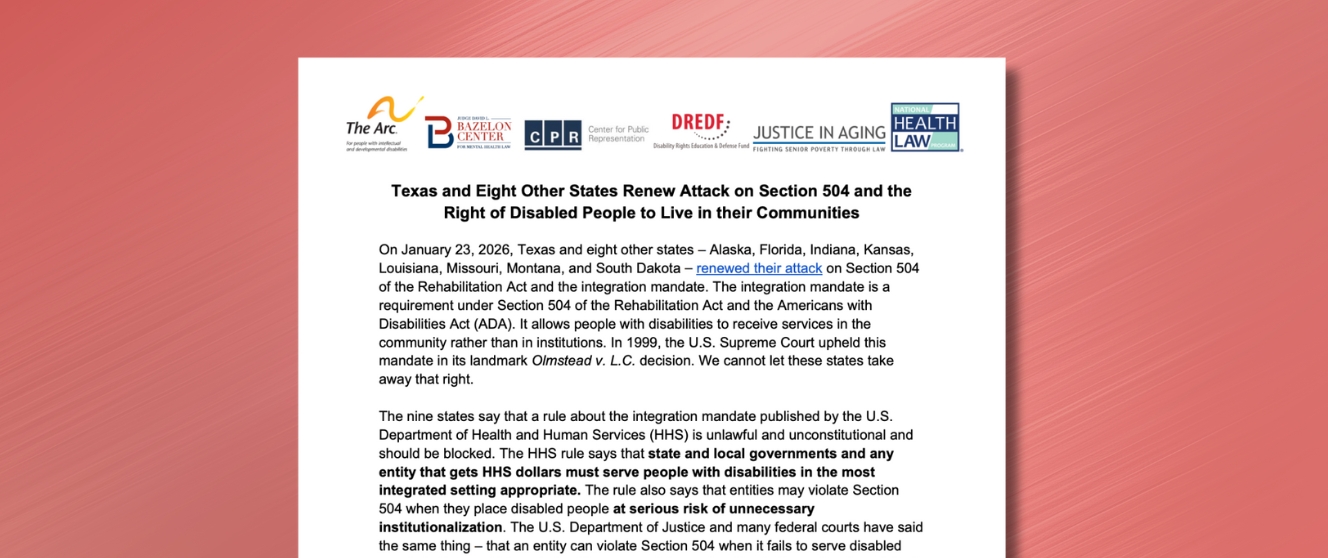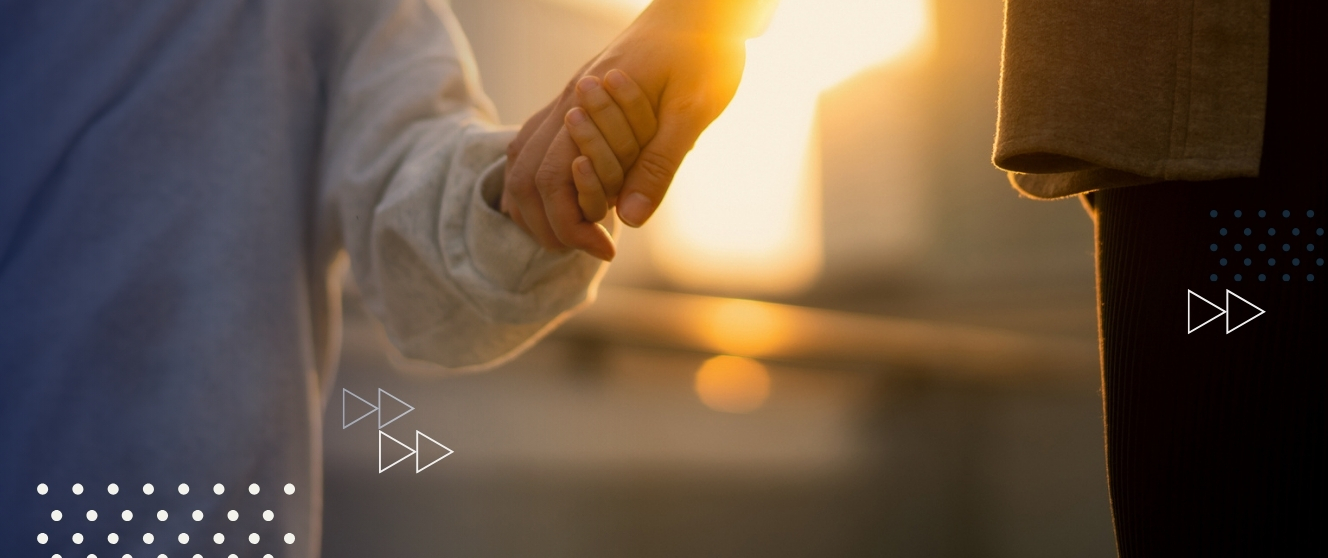
September 22, 2020
Submitted via www.regulations.gov
Regulations Division, Office of General Counsel
Department of Housing and Urban Development
451 7th Street SW, Room 10276
Washington, DC 20410-0500
Re: HUD Docket No. FR-6152-P-01, RIN 2506-AC53 Comments in Response to Proposed Rulemaking: Making Admission or Placement Determinations Based on Sex in Facilities Under Community Planning and Development Housing Programs
Dear Office of General Counsel:
The Disability Rights Education and Defense Fund (DREDF) appreciates the opportunity to provide comment on the Department of Housing and Urban Development’s (HUD) proposed rule change, which was published in the Federal Register on July 24, 2020 (RIN 2506-AC53; HUD Docket No. FR-6152-P-01) and entitled, “Making Admission or Placement Determinations Based on Sex in Facilities Under Community Planning and Development Housing Programs” (“the proposed rule change”). Given that the proposed rule change will put access to vitally needed public resources, emergency shelters, at risk we ask that this proposed rule change be completely withdrawn.
DREDF is a national cross-disability law and policy center that protects and advances the civil and human rights of people with disabilities through legal advocacy, training, education, and development of legislation and public policy. DREDF is a unique alliance of adults with disabilities and parents of children with disabilities. Our vision is a just world where all people, with and without disabilities, live full and independent lives free of discrimination.
People with disabilities and their families face a national shortage of accessible and affordable housing, particularly people with disabilities at the lowest income levels. People with disabilities often have few financial resources and remain among the country’s poorest, and far too often, encounter multiple forms of discrimination when seeking employment or housing. The lack of sufficient safe, accessible, affordable housing is a continuing and significant barrier to integrated community living, making it difficult for people with disabilities to move from segregated facilities into the community, putting many people with disabilities at risk of unnecessary institutionalization or homelessness. According to the United States Interagency Council on Homelessness, people with disabilities are disproportionately over-represented among populations experiencing homelessness and on any given day almost one-quarter (24%) of individuals experiencing homelessness are people with disabilities who met the federal definition of experiencing chronic homelessness.[1]
Research has also consistently demonstrated the high prevalence of disability among transgender people. According to one survey conducted in 2015 by the National Center for Transgender Equality, 39% of the nearly 28,000 transgender respondents had one or more disabilities, compared to the 15% disability prevalence of the general population.[2] Given the fact that transgender people have higher rates of disability, the proposed rule change, which threatens the ability of transgender people to access homeless shelters, would affect many people with disabilities. By reducing the availability of shelters for transgender people with disabilities, the proposed rule change would also undermine the federal government’s goal[3] of reducing chronic homelessness among people with disabilities.
Disabled people already face physical and programmatic barriers to accessing shelters. In a report on emergency shelters in Orange County, California, the American Civil Liberties Union Foundation of Southern California found that the process for requesting reasonable accommodations at three shelters was ineffective[4] and that staff members systematically discriminated against people with special needs by denying them access to the Courtyard when they exhibit symptoms of mental illness or appear to be too disabled, ill, or elderly to take care of themselves.[5] In Butler v. City of New York, No. 15-CV-3783 (S.D.N.Y. 2015), the class action complaint alleged that the Defendants discriminated against homeless people with disabilities in many ways, but particularly by (1) failing to provide reasonable modifications necessary for the Class to obtain temporary shelter in violation of 42 U.S.C. § 12112(b)(5)(A) and 28 C.F.R. § 35.130(b)(7); and (2) by failing to ensure that its facilities and its contractors’ facilities are accessible, and therefore placing them in shelters with unreasonable architectural barriers that in effect defeat or substantially impair their right to shelter in violation of 28 C.F.R. §§ 35.130(b)(4)(i)-(ii).[6] The case subsequently settled, with the defendants agreeing to provide significant reforms.[7] Unfortunately these kinds of problems with accessing shelter are not unique. People with disabilities who are experiencing homelessness need better access to shelters, but the proposed rule change would make accessing shelter even harder.
It should not need to be said that transgender people deserve to live lives that are gender-affirming and free of discrimination. However, DREDF understands that the proposed rule change is just one part of the current administration’s ongoing efforts to limit the rights and protections for the LGBTQ+ community, particularly transgender people.[8] In stripping protections for transgender and gender non-conforming people seeking HUD-funded shelter and reinforcing harmful and dangerous stereotypes about transgender persons, particularly transgender women, the proposed rule promotes rather than protects against discrimination.
The proposed rule allows temporary, emergency single-sex shelters to require someone seeking shelter to provide evidence of their sex based merely on “a good faith belief” that the person is not of the biological sex that the shelter serves. This “good faith belief” standard needlessly invites sex stereotyping and invasive questioning by program staff. Some people may avoid seeking shelter simply to avoid experiencing such stereotyping and invasive questions. Some people seeking shelter may undergo the stereotyping and questioning only to ultimately be turned away. Either way, the result would be a reduction in access to shelter based on the beliefs of the shelter provider.
The proposed rule would also affect cisgender people who may not appear to exhibit characteristics that a shelter provider believes are “typical” of their biological sex. As a result, the proposed rule may also affect cisgender people whose disabilities affect their appearance in ways that might cause them to be misgendered, such as a cisgender man with gynecomastia, or enlarged breasts, from cancer treatment.
DREDF also believes that the current COVID-19 global pandemic provides a further reason not to finalize the proposed rule change. Reducing access to safe and healthy shelters for transgender persons through the proposed rule change will make it more difficult for individuals to safely physically distance and self-isolate. Given that COVID-19 is an infectious and deadly disease, creating additional obstacles to safely physically distancing and self-isolating risks the health of the persons denied shelter as well as that of their communities. Disabled people have already faced heightened risks during the COVID-19 pandemic. Some individuals with disabilities are more vulnerable to contracting COVID-19 and, if they do, may get more sick and have a higher chance of dying.[9] The lives of people with disabilities are as equally worthy and valuable as those of people without disabilities and they deserve to be able to stay safe. Unfortunately, the proposed rule change would needlessly put the lives of many people with disabilities at risk.
As previously stated, the proposed rule change would create a significant barrier to transgender people seeking shelter, many of whom are people with disabilities. People with disabilities already face high rates of chronic homelessness, heightened difficulty securing accessible shelter, and heightened risk from the COVID-19 global pandemic. The proposed rule change needlessly reinforces harmful stereotypes and promotes discrimination. Making these changes at a time when the country is facing its greatest public health crisis in over a century is unthinkably cruel. We strongly recommend that HUD completely withdraw the proposed rule change and instead focus on addressing the longstanding barriers that people with disabilities face in accessing shelters and more permanent housing. In order to protect themselves and their communities, people with disabilities need more, not less access to safe housing.
Thank you for the opportunity to submit comments on the proposed rule change. Please feel free to contact Elaine Lewis or Sydney Pickern with respect to this comment at:
Disability Rights Education and Defense Fund
3075 Adeline Street, Suite 210
Berkeley, CA 94703
510.644.2555 v
510-841-8645 fax/tty
info@dredf.org
Sincerely,
A. Elaine Lewis
Staff Attorney
Sydney Pickern
Staff Attorney
[1] United States Interagency Council on Homelessness, HOMELESSNESS IN AMERICA: Focus on Chronic Homelessness Among People With Disabilities, 1 (August 2018) available at https://www.usich.gov/resources/uploads/asset_library/Homelessness-in-America-Focus-on-chronic.pdf.
[2] Disability Rights Education & Defense Fund, Health Disparities at the Intersection of Disability and Gender Identity: A Framework and Literature Review, 2 (July 2018), available at https://dredf.org/wp-content/uploads/2018/07/Health-Disparities-at-the-Intersection-of-Disability-and-Gender-Identity.pdf.
[3] See United States Interagency Council on Homelessness, https://www.usich.gov/goals/chronic/
[4] American Civil Liberties Foundation of Southern California, This Place is Slowly Killing Me: Abuse and Neglect in Orange County Emergency Shelters, at 26 (March 2019) available at https://www.aclusocal.org/sites/default/files/aclu_socal_oc_shelters_report.pdf.
[5] Id. at 28.
[6] Butler v. City of New York, No. 15-CV-3783 (S.D.N.Y. 2015) Amended Complaint, available at https://www.coalitionforthehomeless.org/wp-content/uploads/2017/08/FiledComplaint_Aug2017.pdf.
[7] Coalition for the Homeless, Notice Of Proposed Settlement Of Class Action Concerning Access To Shelter For Individuals With Disabilities In The New York City Department Of Homeless Services (DHS) Shelter System, available at https://www.coalitionforthehomeless.org/get-help/disability-accommodation-2/butler-notice-en/.
[8] National Center for Transgender Equality, The Discrimination Administration (May 15, 2020), available at https://transequality.org/the-discrimination-administration
[9] See Centers for Disease Control, People With Certain Medical Conditions, Updated September 11, 2020, available at https://www.cdc.gov/coronavirus/2019-ncov/need-extra-precautions/people-with-medical-conditions.html?CDC_AA_refVal=https%3A%2F%2Fwww.cdc.gov%2Fcoronavirus%2F2019-ncov%2Fneed-extra-precautions%2Fgroups-at-higher-risk.html.

